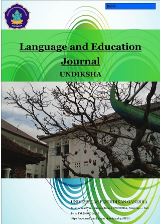EFL UNIVERSITY STUDENT ENGAGEMENT ON THE USE OF ONLINE DISCUSSION IN NORTH BALI
DOI:
https://doi.org/10.23887/leju.v4i1.29938Keywords:
Blended-Learning, Student Engagement, Online DiscussionAbstract
This study aimed to investigate the university student engagement in the use of online discussions in English as a Foreign Language (EFL) Context in North Bali. Moreover, it was used to analyze university student limitations and supporting factors in the use of online discussions as part of blended-learning. The university student engagement was determined by Schlecthy’s theory of student engagement level. The result showed that the university student engagement in North Bali referred to the Ritual Compliance Level. They have low attention and no commitment in learning. They tend to learn dependently and work only for the sake of compliance. Besides, six factors were limited and five factors were supported them during the learning process through online discussion. Therefore, lecturers were suggested to create a pleasant learning atmosphere by building a good relationship with students in order to make students engaged in the online discussions.
References
Al-Rahmi, W. M., Alias, N., Othman, M. S., Marin, V. I., & Tur, G. (2018). A model of factors affecting learning performance through the use of social media in Malaysian higher education. Computers and Education, 121, 59–72. https://doi.org/10.1016/j.compedu.2018.02.010
Alamri, H., Lowell, V., Watson, W., & Watson, S. L. (2020). Using personalized learning as an instructional approach to motivate learners in online higher education: Learner self-determination and intrinsic motivation. Journal of Research on Technology in Education, 52(3), 322–352. https://doi.org/10.1080/15391523.2020.1728449
Alzahrani, M. G. (2017). The effect of using online discussion forums on students’ learning. Turkish Online Journal of Educational Technology, 16(1), 164–176.
Blakemore, T., & Agllias, K. (2019). Student Reflections on Vulnerability and Self-awareness in a Social Work Skills Course. Australian Social Work, 72(1), 21–33. https://doi.org/10.1080/0312407X.2018.1516793
Chan, E. Y. M. (2019). Blended learning dilemma: Teacher education in the confucian heritage culture. Australian Journal of Teacher Education, 44(1), 36–51. https://doi.org/10.14221/ajte.2018v44n1.3
Chen, B., Chang, Y. H., Ouyang, F., & Zhou, W. (2018). Fostering student engagement in online discussion through social learning analytics. Internet and Higher Education, 37(2018), 21–30. https://doi.org/10.1016/j.iheduc.2017.12.002
Dewi. (2019). STUDENTS’ PERCEPTION TOWARD THE IMPLEMENTATION OF ASYNCHRONOUS ONLINE DISCUSSION USING SCHOOLOGY IN ENGLISH LANGUAGE UNIVERSITY OF EDUCATION (THESIS).
Digamon, J. S., & Cinches, M. F. C. (2017). Schlechty’s student engagement continuum in the work team experience: A pilot study. Journal of Institutional Research South East Asia, 15(3), 5–18.
Dwivedi, A., Dwivedi, P., Bobek, S., & Sternad Zabukovšek, S. (2019). Factors affecting students’ engagement with online content in blended learning. Kybernetes, 48(7), 1500–1515. https://doi.org/10.1108/K-10-2018-0559
Han, F., & Ellis, R. A. (2019). Identifying consistent patterns of quality learning discussions in blended learning. Internet and Higher Education, 40, 12–19. https://doi.org/10.1016/j.iheduc.2018.09.002
Islam, S., Baharun, H., Muali, C., Ghufron, M. I., Bali, M. E. I., Wijaya, M., & Marzuki, I. (2018). To Boost Students’ Motivation and Achievement through Blended Learning. Journal of Physics: Conference Series, 1114(1). https://doi.org/10.1088/1742-6596/1114/1/012046
Kallio, J. M., & Halverson, R. (2020). Distributed leadership for personalized learning. Journal of Research on Technology in Education, 52(3), 371–390. https://doi.org/10.1080/15391523.2020.1734508
Kintu, M. J., & Zhu, C. (2016). Student characteristics and learning outcomes in a blended learning environment intervention in a Ugandan university. Electronic Journal of E-Learning, 14(3), 181–195.
Lee, J., & Martin, L. (2017). Investigating students’ perceptions of motivating factors of online class discussions. International Review of Research in Open and Distance Learning, 18(5), 148–172. https://doi.org/10.19173/irrodl.v18i5.2883
Lyu, X. (2018). The Effectiveness of Online Discussion Forums and Recommendations for Chinese Higher Education. 信阳师范学院, 10(2), 1–15.
Martin, F., & Bolliger, D. U. (2018). Engagement matters: Student perceptions on the importance of engagement strategies in the online learning environment. Online Learning Journal, 22(1), 205–222. https://doi.org/10.24059/olj.v22i1.1092
Mohd, I. H., Aluwi, A. H., Hussein, N., & Omar, M. K. (2017). Enhancing students engagement through blended learning satisfaction and lecturer support. 2016 IEEE 8th International Conference on Engineering Education: Enhancing Engineering Education Through Academia-Industry Collaboration, ICEED 2016, December, 175–180. https://doi.org/10.1109/ICEED.2016.7856067
Mulia, N. A. (2020). Indonesian EFL Students’ Engagement in Online Languange Learning Platform. Retain, 8, 154–163.
Pardo, A., Han, F., & Ellis, R. A. (2017). Combining University student self-regulated learning indicators and engagement with online learning events to Predict Academic Performance. IEEE Transactions on Learning Technologies, 10(1), 82–92. https://doi.org/10.1109/TLT.2016.2639508
Pascucci, F., Cardinali, S., & Gregori, G. L. (2017). International Journal of Entrepreneurship and Small Business. International Journal of Entrepreneurship and Small Business, 32(1–2), 1–6. https://doi.org/10.1504/IJESB.2017.10001159
Saritepeci, M., & Çakir, H. (2015). Harmanlanmiş öʇrenme ortamlarinin ortaokul öʇrencilerinin derse katilimi ve akademik başarisina etkisi: Sosyal bilgiler dersi örneʇi. Egitim ve Bilim, 40(177), 203–216. https://doi.org/10.15390/EB.2015.2592
Schlechty, P. (2002). Working on the work: an action plan for teachers principals and superintendents (1st). Jossey Bass.
Sugiyono. (2016). Qualitative Research Methods, Quantitative and R & D. Alfabeta.
Wiraningsih, P., & Santosa, M. H. (2017). Journal on English as a foreign Language 21 st century teachers: The students’ perspectives. 7(1), 77–96.
Zainuddin, Z., Habiburrahim, Muluk, S., & Keumala, C. M. (2019). How do students become self-directed learners in the EFL flipped-class pedagogy? A study in higher education. Indonesian Journal of Applied Linguistics, 8(3), 678–690. https://doi.org/10.17509/ijal.v8i3.15270










